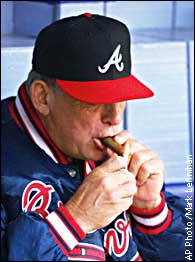| | Since 1991, the Atlanta Braves, managed by Bobby Cox, have won eight division titles & but only one World Series. A disappointment to Braves fans? Yes. An indictment of Cox's managerial abilities? Perhaps. But let's not allow Atlanta's October failures, both real and imagined, divert our attention too far from the amazingly consistent winning by Cox and the Braves.
|  | | Injury-riddled Atlanta smoked the National League thanks to Braves manager Bobby Cox. |
Because it's certain that no team has dominated its regular-season competition like this, at least not since the New York Yankees won 14 American League pennants from 1949 through 1964.
Look at 1999. The Braves lost their first baseman before the season. The Braves lost their closer before the season. The Braves lost their All-Star catcher early in the season. Two of the Braves' best starters suffered their worst seasons in recent memory, and another went on the disabled list twice.
Yet somehow, some way, the Braves managed to win 103 games in 1999, only three fewer than they'd won in 1998.
But how good a manager is Cox? Obviously, his raw numbers are excellent, including a .558 career winning percentage that ranks 12th among 20th-century managers. But of course, he's had some pretty good players over the years, first in Toronto (1982-1985) and then Atlanta (1990-present). In fairness to Cox, though, he also managed the Braves from 1978 through 1981 and, Dale Murphy notwithstanding, that was not a star-studded roster.
In "The Bill James Guide to Baseball Managers," author James presents a system for establishing "expected wins" for teams, and from there we can compare a manager's actual wins to the expected wins. As James wrote,
The best way I have found to establish expected wins for a team based on previous seasons is to combine four elements, which are the records of the team in the previous three seasons, and a .500 record. The record of the team in the last season is 50% of the load. The .500 record is 25%, since all teams have a pronounced tendency to drift toward .500. The records of the team the two previous seasons are each one-eighth, 12.5%.
Run through the numbers for the 1999 Braves, and we arrive at 98 expected wins. They actually won 103, so Cox gets a plus-5 for 1999. Now, plus-5 sounds pretty good, and it is. However, that's nothing for Bobby Cox, who was plus-8 in 1997 and plus-11 in 1998. In fact, by this particular method, Bobby Cox is the greatest manager that ever lived &
Manager Good Bad +/-
Bobby Cox 12 1 +139
Joe McCarthy 17 4 +126
John McGraw 17 9 +116
Billy Martin 10 1 + 98
Dick Williams 11 5 + 92
Yes, Bobby Cox has more games on the plus side of the ledger than anybody, Hall of Famers included. The "Good" and "Bad" columns, by the way, describe the number of seasons in which a manager was either plus-2 or better, or minus-2 or worse.
If Cox is No. 1 on the all-time list, how does he compare to active managers? Well, as you might imagine, nobody's even close to him. Among active managers with at least 10 seasons under their belts, Cox is far ahead of Davey Johnson (+52), Bobby Valentine (+45), Tony La Russa (+25), Lou Piniella (+18), Joe Torre (+7), Tom Kelly (-17) and Jim Leyland (-21).
The method does have its limitations, especially these days. For example, Jim Leyland's low score is due almost entirely due to Florida's 54-108 record in 1998, and that was hardly Leyland's fault. In fact, in his book James writes that, "to the extent that I would rate managers, I would use the point system introduced earlier in this article, rather than the plus/minus system."
That point system gives managers variable credit for regular-season victories and postseason victories. We can't figure Cox's totals through 1999 until the Braves finish their postseason, but the way things stand now, he's got 37 points. That ties him for 11th all-time with Miller Huggins, and he'll move up to eighth if the Braves win the World Series. Still, Cox has no chance of moving to the top of the list, where John McGraw (79 points), Connie Mack (72) and Joe McCarthy (71) occupy the top three spots.
But in terms of consistent, year-to-year, regular-season performance, one can argue that Bobby Cox goes to the head of the class. How does he do it? Well, over the years Cox has shown the uncanny ability to keep his pitchers healthy, and he also has a keen eye for effective bullpen help. He hasn't been afraid to get young players into the lineup. Those are the obvious things. It also seems quite obvious that he creates an environment that is conducive to winning.
Is Bobby Cox a brilliant "in-game" manager, a strategist on par with John McGraw or Davey Johnson?
No, he probably is not. But if you've got a team and you want to win 100 regular-season games this year, the next year and the year after, Bobby Cox is your man.
| |
ALSO SEE
Astros vs. Braves series page
Team of the decade
 |



